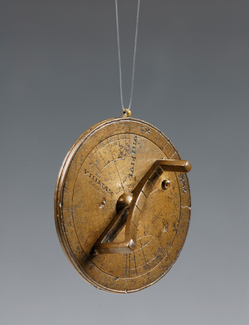Time and Cosmos in Greco-Roman Antiquity
This article first appeared in ISAW Newsletter 15, Spring 2016.
Rachel Herschman
Curatorial Assistant
 Portable Universal Sundial Bronze, H. 6.4 cm; W. 6.1 cm; D. 2.5 cm Near Bratislava (?), ca. 250 CE Museum of the History of Science, Oxford: 51358
The ancient Greeks and Romans contributed more than any other past civilization to the rise of time’s dominion over individual and public life. Adapting ideas from Egypt and Babylonia, they divided the day into hours, and invented sophisticated instruments and devices to mark their passage.
Portable Universal Sundial Bronze, H. 6.4 cm; W. 6.1 cm; D. 2.5 cm Near Bratislava (?), ca. 250 CE Museum of the History of Science, Oxford: 51358
The ancient Greeks and Romans contributed more than any other past civilization to the rise of time’s dominion over individual and public life. Adapting ideas from Egypt and Babylonia, they divided the day into hours, and invented sophisticated instruments and devices to mark their passage.
Time and Cosmos in Greco-Roman Antiquity explores the ways that time was organized and kept track of in the Greco-Roman world, and how it was conceived in relation to the Cosmos. The displayed objects will include artifacts illustrating the technology of ancient time reckoning and the social role, perception, and visualization of time and cosmos; the selection will also highlight the contrasting formative roles of indigenous Greek and Roman cultural practices and contact with the civilizations of Mesopotamia and Egypt as well as the peoples of northwest Europe. The exhibition will be organized around two themes: the Tools of Time Reckoning, exploring the material resources that gave temporal structure of the daily life of private individuals and the community in public spheres such as religion, commerce, and law, and Reflections of Time and Cosmos, concerning ancient representations of time, the universe, and their power to shape the environment and human destiny.